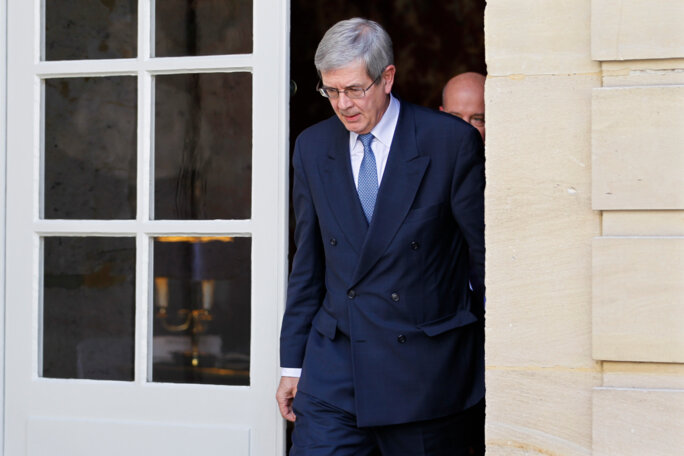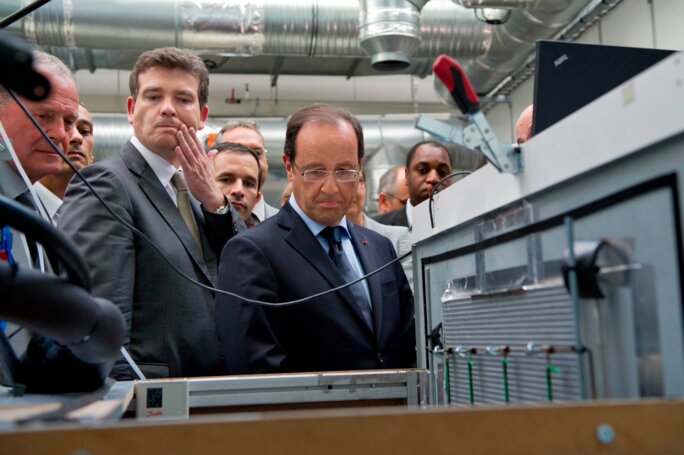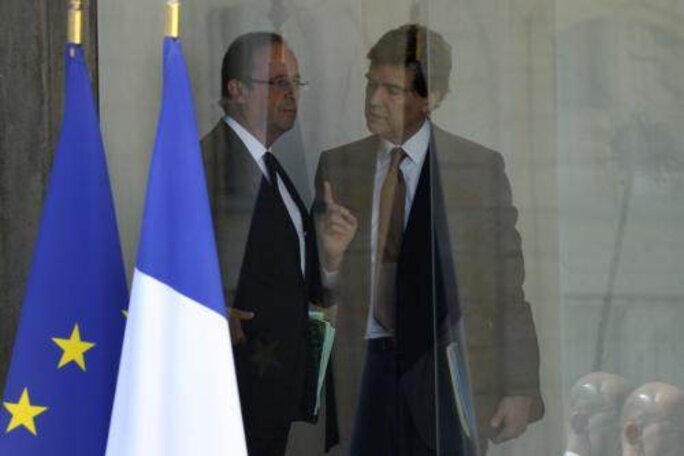Arnaud Montebourg's feet have barely touched the ground since his appointment in May as France's Minister of Productive Recovery, a fancy title that corresponds broadly to the role of industry minister.
Amid the corridors of his ministry, he appears to be permanently rushing around, carrying a look of exhaustion. The issues piling up on his desk include Unilever's plans to close its Fralib factory near Marseille, the 1,000 jobs at risk at troubled poultry group Doux, ArcelorMittal's mothballing of a steelworks in eastern France, LyondellBasell's decision to sell its refinery in Berre in southern France, and most notably PSA Peugeot Citroen's announcement of 8,000 job cuts and the closure of its historic Aulnay site north of Paris.
In response, Montebourg, 49, puts on a real performance, issuing thunderous statements, making frequent media appearances and attracting a trail of TV cameras wherever he goes.

In the National Assembly he has become the bête noire of the right-wing opposition and the star attraction when ministers answer parliamentary questions. Because of the intense pace of the industrial news agenda, he had to respond to eight questions in the last three sessions. And when he starts to speak, he is greeted by sounds of mockery from the UMP party benches, while some opposition members put on pained expressions when he responds to questions. But Montebourg maintains his pompous style, paraphrasing Kennedy for example to describe hybrid vehicles as a "New Frontier".
Montebourg has often been the object of scorn but seemed not to care. Even his socialist colleagues have for many years treated him - more or less openly - with disdain, variously describing him as a nuisance, an amateur, opportunistic, and incapable of building a lasting alliance within the Socialist Party. They regarded him as isolated and on his appointment sometimes had a hearty laugh at the new title given to his ministry.
"Arnaud Montebourg is very clever but he is a man of the 19th century," commented an Élysée presidential palace advisor this summer, speaking on condition of anonymity. A minister, also speaking on condition of anonymity, added: "A good minister is not someone who spends his time showing off but someone who is in tune with the rest of the government."
Several of his colleagues watched the early stages of Montebourg's ministerial career with slight amusement and scepticism, convinced that this champion of deglobalisation in last year's socialist presidential primary would sooner or later slip up, make one tactless remark too many and be put in his place.
But their views have undoubtedly changed since then. "When we took office, we laughed at the new name for the ministry, like many French people,” commented one of Montebourg's circle within the ministry. “But when Montebourg very quickly decided that he had a role to play when companies laid off staff and that the division of power with [labour minister Michel] Sapin meant that we were in control as long as a firm was still alive, then we had less reason to laugh."

Enlargement : Illustration 2

Driven by the urgent need to protect jobs, Montebourg decided to take a resolute approach on all fronts, in contrast to the more measured statements of his government colleagues, leading to speculation of his isolation within Prime Minister Jean-Marc Ayrault's team. And when he launched a direct attack on the Peugeot family over the job cuts at PSA, many columnists thought that a government reshuffle was on the cards.
The Peugeot family, which owns 25% of the carmaker, is seen on both the Left and the Right and in industry circles as an emblem of French family-based capitalism, and therefore beyond criticism. The prime minister seemed to distance himself from Montebourg by welcoming PSA CEO Philippe Varin to his office, the Hôtel Matignon, on July 23rd and by adopting a more conciliatory tone in the press release issued after the talks. Montebourg had not approved the statement and was furious.
'He is a key part of Hollande's strategy'
But this does not mean that Montebourg is isolated. "Arnaud has been charged with the task of implementing a new form of industrial policy that represents a break both from the tradition of nationalisation and state planning and from the social liberalism of the 1990s," says MP Thierry Mandon, one of the lynchpins of Montebourg's campaign in the socialist primary. "Delivering this new policy approach is not easy. It is being made up as we go along and it is logical that there should be a debate within the government on priorities, the pace of change and the balance to be struck between making demands on the private sector and avoiding the impression that we are against companies."
"For example, Ayrault is sceptical about the government's ability to curb PSA's planned layoffs, while Montebourg thinks that even if we can only save 200 guys' jobs, then that is still a good thing," explains a minister.
"They all have the same goals but don't necessarily all favour the same means, Montebourg is more aggressive in his dealings with company bosses," conceded one presidential advisor who doesn’t hide that he is less than keen on the minister's style. But he then added: "This serves a useful purpose within government. We need to be demanding and attract confidence. And from this point of view Sapin and Montebourg are complementary."
And everyone agrees on one key point - that Montebourg enjoys the support of President François Hollande. With the exception of his recent criticism of the Paris transport authority's decision to move a call centre from France to Morocco, he has always been backed by Hollande. Hollande has used the same words as Montebourg to describe Peugeot's job cuts plan, calling them "not acceptable". He went on to accuse the carmaker's management of lying and said the layoff plan would have to be renegotiated. And when Hollande visited car parts maker Valeo on July 27th, he was accompanied by Montebourg and junior economy minister Benoît Hamon, leader of the Socialist Party's left-wing current. "Hollande invited Montebourg to travel in his car with him, and had some friendly words for him," said Mandon.

Enlargement : Illustration 3

"People can talk about different issues but Montebourg has the support of the Élysée. He is a key player in the president's political strategy," says one of his allies. This view is confirmed by those around the president. "There is definitely no move to isolate Arnaud Montebourg, and certainly not by the Élysée," insists the presidential advisor. Moreover, Aquilino Morelle, Montebourg's campaign manager in the primary, is now a special advisor to Hollande.
"After the primary François Hollande saw that he needed to strike a slightly different political balance,” says a Montebourg ally. “And since he has been at the Élysée, he has adopted a very socialist stance. His centre of gravity is more to the Left than we would have expected."
'If he is ignored, things will go very badly'
After beating party leader Martine Aubry in the final voting in last autumn's primary, Hollande modified some of his policy positions, made Aquilino Morelle his speechwriter and asked Montebourg to take his message into industry. "I made an appeal for industrial patriotism and this appeal was understood,” Montebourg said at the time. ”I want to show that you can carry out an economic policy through political means."
Hollande's campaign speech to the Socialist Party faithful at Le Bourget in January also delighted Montebourg's supporters, who were won over by the presidential candidate's attack on the world of finance which he described as his "enemy".
"On questions of finance, it is Aquilino [Morelle], Montebourg and Ségolène [Royal] who have been proved right," Hollande said.
Other socialist figures suspect that Hollande's support for Montebourg is more a tactical alliance, designed to pacify the Radical Left and allow the government to use a "good cop bad cop" approach. "In the government, jobs are shared out in a way that works well [...] In any negotiation, you need there to be one good guy and one bad guy," the Élysée advisor comments.

Whether it is genuine or tactical, it remains to be seen how long this support from Hollande will last. And particularly whether it will lead the government to back the legislative proposals pushed by Montebourg but which are still the subject of disagreement within Ayrault's team. A key battleground will be a proposal that would oblige industrial groups to sell potentially profitable sites rather than just closing them down. This was one of Hollande's campaign promises and it is strongly supported by Montebourg, but Ayrault, the finance ministry and Sapin are less than enthusiastic.
"This will be the moment of truth. Montebourg wants to show that even if the government can't do everything, it can still do something. And what it can do is make laws," says Paul Alliès, a ranking member of the Socialist Party and a Montebourg ally. "The economic situation will be so disastrous in the autumn that the government will need to make some strong decisions. Arnaud cannot lose out on all of these," says another of his Socialist Party friends. And Montebourg won the backing of socialist MPs for the law on the sale of profitable industrial sites just before his departure on holiday this summer. "I want the proposal for the so called Hollande Law to come before parliament as soon as possible and for it to be put on the parliamentary agenda without delay," says the socialist parliamentary group's leader, Bruno Le Roux. Meanwhile, an advisor to Sapin cautions: "It is a very complicated subject but Montebourg is intelligent, so he will pull it off."
But Montebourg does not win universal approval on the Left, particularly among the socialists’ Green party allies, EELV. He supports nuclear power and the production of shale gas, placing him at opposites with ecology minister Delphine Batho of the EELV. He reiterated his view at a lunch with Green party MPs on July 31st. "On shale gas he has a productivist view that is in total contradiction with his partial acceptance of ecologist views on many other points," said EELV MP François-Michel Lambert, who was present at the lunch meeting.
The paradox with Montebourg is that he does not get wider backing on issues where he has the support of the Greens, such as his aggressive actions to protect jobs or his idea of taxing low-cost airlines, but does "when he pushes policies that make no sense", says Lambert. He says the EELV is too prudent to launch an explicit attack on the minister, although this advice was ignored by Jean-Vincent Placé, the Green party leader in the Senate. "I am not convinced by the style of Arnaud Montebourg,” he said. “There is something that worries me about him."
Montebourg does not have many followers in parliament who could respond on his behalf. Although there are a dozen MPs who share some of his ideas, and who he has twice brought together for lunch meetings, none have publicly come out in his support and none signed his contribution for the October Socialist Party congress in Toulouse, which will set the party's policy line for the next three years. Thierry Mandon categorically refuses to act as his ambassador in the National Assembly. "I am not looking to build a Montebourg faction among socialist MPs," he said. And the development of a Montebourg group within the wider Socialist Party by Paul Alliès is still in its infancy.
"Will the Hollande-Montebourg alliance stand the test of time? The party congress will be a key moment,” concludes Alliès. “At present, Martine Aubry is doing everything possible to marginalise him but if Arnaud Montebourg is not taken into account, things will turn out very badly."
-------------------------
English version: Steve Whitehouse
(Editing by Graham Tearse)


